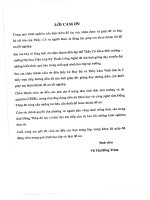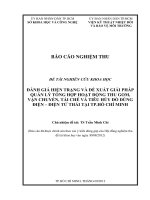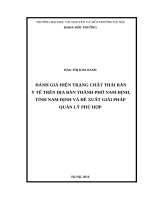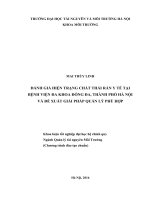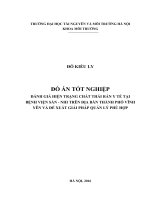Đánh giá hiện trạng và đề xuất giải pháp quản lý tổng hợp hoạt động thu gom, vận chuyển, tái chế và tiêu hủy đồ dùng điện - điện tử thải tại TP.HCM
Bạn đang xem bản rút gọn của tài liệu. Xem và tải ngay bản đầy đủ của tài liệu tại đây (6.07 MB, 277 trang )
BAN NHÂN DÂN TP.HCM
KHOA
BÁO CÁO M THU
ĐỀ TÀI NGHIÊN CỨU KHOA HỌC
30/08/2012)
, THÁNG 09/2012
ii
ĐỀ TÀI NGHIÊN CỨU KHOA HỌC
K/T.
9/2012
iii
1. :
-
Chí Minh
2.
3. :
Vi
Fax: 08.38432670
4. :
T 5/2012 -
G-
15/05/2012)
5. inh phí
6. :
-
-
7.
-
c
-
-
-
-
iv
-
-
.
-
và 1500 VDC, .
-
ngh
TP.HCM
v
n
-
TP.HCM.
-
-
thông.
vi
SUMMARY OF RESEARCH CONTENT
Waste electrical and electronic equipment or e-waste is domestic and
industrial products that are not satisfied design-use purpose and are end of life.
According to Directive 2002/96/EC dated January 27
th
2003 of European Union,
electrical and electronic equipment is designed for use with a voltage rating not
exceeding 1000 volts for alternating current and 1500 volts for direct current,
divided into 10 categories. Since time and budget is limited, the scope for the given
research covered only three groups of product: computer, cell phone and television.
E-waste management in Vietnam is started recently. The Draft "Decision of
the Prime Minister on the collection and disposal of some products expired or
discarded" by the Ministry of Natural Resources and Environment was drafted and
is awaiting to be approved by the Prime Minister. However, this decision so far has
not been promulgated. Both very important economic tools in the e-waste
management: deposit refund and fee for treatment/recycle, still have not been
applied in Vietnam.
In Ho Chi Minh City, material flow of e-waste causes pressure and challenge
for environmental management system while manufacturers/distributors have not
implemented take-back/collection activities up to date, and a poor management is
combined with poor technical infrastructure and yearly increase of e-waste volume.
The research shows that among enterprises dealing with collection, transport,
storage of e-waste in Ho Chi Minh City, only 7.5% operates under regular license,
92.5% of them operates without a regular license. Size of the enterprises is rather
small (97.5%). E-wastes are kept in improper waste storage place at conditions that
do not meet safety and environment requirements. The operation of recycling and
disposal of e-waste mainly is unregistered.
The sources of e-waste collected in Ho Chi Minh City can be classified into
2 groups: in-situ sources likes households, offices, schools, hotels manufacturers,
distributors, repairers and ex-situ sources likes provinces is the Cuu Long River
Delta, from illegal import. The method applied for e-waste volume forecast is
consumption and use. Our result shows that in Ho Chi Minh City quantity of e-
waste (only computer, cell phone and television) is about 6,140 ton/year in 2011;
can reach up to 6,510 7,910 ton/year in 2015 and 7,000 10,860 ton/year in 2020.
End-point of e-waste flow is to be highlighted as it is Chinese market. We
applied different methods with the principal is analyzing the ratio of the waste
stream (method of Mathew 1997 - Carnegie Mellon University) for building
material balance to address end-point of e-waste flow. Thus, up to 92.4% of e-
waste amount in Ho Chi Minh city to be exported China through transborder lot
based trade; only 7.6% remains to be disposed of as hazardous waste.
A pilot model for e-waste collection has been implemented in the People's
Committee of Ward 10, Phu Nhuan District. The result shows that e-waste
collection model could be expanded in Ho Chi Minh City, if a relevant funding
sources for starting is available at an enhanced awareness among the city
population.
vii
To manage e-waste in Ho Chi Minh City in the future, three models of e-
waste management are proposed under each different phase: i) E-waste
management model for the first phase for Ho Chi Minh City applicable until the
"Decision of the Prime Minister's regulations on the collection and disposal of some
products expired or discarded" is approved; ii) E-waste management model in the
second phase for Ho Chi Minh City to be applicable after the "Decision of the
Prime Minister's regulations on the collection and disposal of some products
expired or discarded" has become valid but until deposit refund regulation
introduced; and iii) E-waste management model in the third phase for Ho Chi Minh
City to be applicable after deposit refund regulation has been introduced.
In addition, a public awareness enhancement program for e-waste and a draft
of regulations on e-waste management in Ho Chi Minh City are proposed.
The objectives of public awareness enhancement program for e-waste are to
provide the community with understanding of e-waste, impact of e-waste to
environment and health, forming the acts of collection, recycle, reuse and disposal
of e-waste properly. The contents of awareness are addressing knowledge, behavior
and media. The stakeholders consist of administration and management agencies;
social - political organizations, civil society organizations and media agencies.
The Draft of regulations on e-waste management in Ho Chi Minh City is
proposed for the second phase. The Draft consists of 4 chapters, 11 articles and 6
annexes. Chapter 1 with 3 articles for general rule; chapter 2 with 3 articles for
responsibility and interest of manufacturer, importer, distributor, consumer; chapter
3 with 3 articles describes responsibility and interest of take-back site, collection
and repair center, recycle and treatment plant; chapter 4 with 2 articles for execution
provision.
viii
iii
iv
SUMMARY OF RESEARCH CONTENT vi
viii
xii
xiv
xvi
1
1.1. -
1
1.1.1. - 1
1.1.2. 4
1.1.3. 7
1.2.
8
1.2.1. 9
1.2.2. 11
14
1.3.
16
16
18
1.3.3. Thái Lan 20
1.3.4. Malaysia 24
1.3.5. Campuchia 25
26
1.4. 26
1. 28
30
33
1.5. 34
1.6. 34
37
- 37
37
37
ix
39
39
39
39
40
- 40
40
40
41
- 41
41
42
44
- 45
2.5.1. Mô 45
45
46
-
46
46
47
47
48
- 48
3.1.1.
48
3.1.2.
53
3.1.3.
57
3.1.4. 59
61
- 61
3.2.2. 64
x
71
- 72
72
79
81
83
- 84
- 84
91
94
101
103
110
116
118
123
- 124
125
127
135
138
- 139
139
143
148
149
153
156
157
159
159
162
164
IÊU DÙNG 171
181
xi
195
204
211
PILOT 225
PILOT 229
233
236
241
253
256
260
xii
BVMT
:
CCN
:
CITENCO
:
CNKT
:
CNTT
:
CTNH
:
DNTN
:
:
:
EC
:
EEE
:
-
HTX
:
IGOs
:
JPY
:
KCN
:
KCX
:
KT-MT
:
-
KT-XH
:
- X
MTV
:
-CP
:
OECD
:
PC
:
Máy vi tính
QCVN
:
-BCN
:
-BTNMT
:
-BYT
:
-TTg
:
Q
-UBND
:
QLCTNH
:
TMDV
:
TNHH
:
xiii
TP.HCM
:
TT-BTNMT
:
TT-BXD
:
TTLT-BCT-BTNMT
:
TV
:
Tivi
TWD
:
-oét
UBND
:
UNEP
:
WEEE
:
-
XHH
:
xiv
DANH
- 1
5
6
-
9
- 10
12
13
16
38
39
40
41
44
46
47
51
51
58
58
59
59
66
68
68
76
77
82
83
91
92
92
94
95
xv
95
96
96
97
101
103
106
108
111
113
116
117
100% 117
118
119
100% 120
122
125
- 126
- 131
135
136
137
140
148
149
xvi
- 11
11
15
15
- 17
- 18
- 19
n -
20
- 21
- 22
-
Lan 23
- 24
- 25
27
29
32
Hình 53
54
54
55
56
64
65
Minh 73
74
74
75
75
80
82
5 84
6 85
7 85
8máy vi tính xách tay 86
86
xvii
87
87
88
89
Hình 3.24 98
Hình 3.25 98
Hình 3.26 99
Hình 3.27 99
Hình 3.28 100
Hình 3.29 100
Hình 3.30. C
102
Hình 3.31 127
Hình 3.32 128
Hình 3.33- 128
Hình 3.34 129
- 130
- 130
Hình 3.37. dùng - 132
Hình 3.38- 133
Hình 3.39 133
Hình 3.40 134
134
Hình 3.42- 135
Hình 3.43 144
Hình 3.44 146
Hình 3.45 147
1
1.
1.1. -
1.1.1. -
-
(UNEP 2009).
Âu, -
; m sau:
các - theo Liên minh Châu Âu
Nhóm 1:
-
-
-
-
-
-
-
-
-
- Lò vi sóng
-
-
-
-
-
-
-
-
-
-
-
-
2
-
-
khác
-
-
-
- Máy tính mini
- Máy in
-
- Máy vi tính xách tay
-
-
- Máy Photocopy
-
-
-
-
- Máy fax
-
-
-
-
-
-
-
- Máy radio
- Tivi
- Máy quay phim
-
-
- Âm ly
3
-
-
Nhóm 5:
sáng
-
-
-
-
-
-
Nhóm 6:
- Máy khoan
-
- Máy khâu
-
-
-
-
-
Nhóm 7:
-
-
- Video game
-
-
-
Nhóm 8:
-
-
-
-
-
4
-
- Máy phân tích
-
-
-
theo dõi
Nhóm 9:
-
-
-
-
-
Nhóm 10:
-
-
-
-
-
Directive 2002/96/EC of The European Parliament and of The Council of 27 January 2003
on waste electrical and electronic equipment
-
Do t
1.1.2.
-
.
-
-
-
niken. -
5
N -
Kim
cho
-
/
Giá
-
%
USD/kg
USD
Ag
20.000
Pb,
Zn
6.000
30
430
2,6
Au
2.500
Cu
300
12
22.280
6,7
Dây
tích phân
Pd
230
PGM
33
14
11.413
0,4
Pt
210
PGM
13
6
41.957
0,5
thermocouple
, pin nhiên
Ru
32
PGM
27
84
18.647
0,5
màn hình
plasma
Cu
15.000.000
4.500.000
30
7
32,1
Dây và cáp
Sn
275.000
90.000
33
15
1,3
Hàn
Sb
130.000
65.000
50
6
0,4
màn hình
CRT
Co
58.000
Ni, Cu
11.000
19
62
0,7
Pin s
Bi
5.600
Pb,
W, Zn
900
16
31
0,03
Se
1.400
Cu
240
17
72
0,02
In
480
Zn, Pb
380
79
682
0,3
màn hình
LCD, hàn,
4.670.000
45,4
UNEP 2009. Sustainable Innovation and Technology Transfer Industrial Sector Studies.
Recycling from E-waste to Resources
Ghi chú:
6
. G
(euro/kg)
2007
2006
2005
2007
2006
2005
Fe (trong các
0,22
0,22
0,15
Zn
1,49
2,42
1,13
3,96
2,9
2,32
Ch
0,4
0,4
0,4
3,96
2,9
2,32
1,37
1,37
1,37
0,22
0,22
0,15
ABS
1,54
1,73
1,46
Cu
4,02
5,34
3,04
ABS/PC
2,84
1,83
1,72
Ag
326
283
193
0,3
0,3
0,3
Au
15.721
15.388
11.753
PC
2,72
2,85
2,85
Pd
7.990
8.324
5.364
PE (HD)
1,07
1,18
1,07
Al (chung)
2,06
1,8
1,64
PE (LD)
1,23
0,97
1,18
Al (cán)
2,06
1,8
1,64
PET
0,66
0,78
0,78
2,06
2,02
1,56
PMMA (PolyMethyl
MethAcrylate)
2,92
3,05
3,05
Mg
1,58
1,57
1,56
PP
1,3
1,14
1,01
As
10,4
1,64
1,52
PS (HI)
1,17
1,32
1,24
Be
259,4
207,6
275,6
PUR (polyurethane)
3,5
3,66
3,66
Bi
15,4
3,89
5,34
PVC
1,25
1,3
1,3
Cd
2,83
2,2
1,03
Cao su (EPDM)
7,29
7,63
7,63
Co
20,22
27,5
42,2
0,04
0,04
0,04
Cr
2,11
3,46
4,2
CRT rim (PbO)
0,4
0,4
0,4
Hg
11,31
14,8
7,93
CRT-
0,3
0,3
0,3
Li
0,66
0,71
3,49
CRT-
chuôi
0,3
0,3
0,3
Mn
2,63
2,83
2,18
CRT-
0,35
0,35
0,35
Ni
27,97
18,73
12,08
0,05
0,05
0,05
Pb
1,25
0,99
0,8
(LCD)
0,05
0,05
0,05
Sb
3,9
3,89
2,19
Br
0,55
0,55
0,55
Sn
9,34
6,26
6,04
Isobutane
0,1
0,1
0,1
United Nations University, Germany, 2007. 2008 Review of Directive 2002/96 on Waste
Electrical and Electronic Equipment (WEEE)
7
-
- trên dàng
dùng -
ân giá
-
-
.
: i/. T
. V
. V
. -
-
MChâu Âu (EEA 2003 -
-
và
-
/
1.1.3.
trong
lai
-
-
-3R).
CCông
8
- t
-
n.
.
- do
gây ra
-
-
-
-
-
-
-
1.2. q
-
thân :
-
- m
